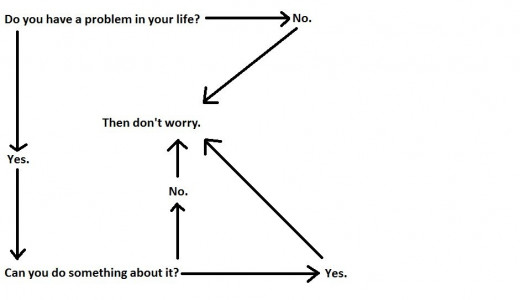The Trident of Control: a Simple Mental Exercise to Fight Anxiety
Can a simple, ancient mental exercise really help me fight anxiety?
Yes or no, it must be subject to experimentation, right? If yes then hooray! If no, then nothing lost, maybe other than a couple of minutes.
Crux of the exercise

Introduction
Our modern lives are busy, crowded, and often so with problems well beyond our domain of control. Everybody knows that no matter how hard we try, bad weather can't be fixed. You can't simply wish he clouds away (at least for most people), nor can you wish someone close to you healed or cured totally from any disease. Yet, our primitive minds fail to understand this, and causes anxiety, worry, depression - making us feel helpless and clueless simultaneously. This bogs down an already troubled mind, and makes us forget the problems that we CAN ACTUALLY FIX! No matter how small or insignificant they may be. Every bit counts, doesn't it?
So what am I saying here? Well, back min the ancient Roman and Greek times, things are even more hectic and beyond-our-control, generally speaking. They didn't have any idea about modern medicine, products easily available today, social security and so much else. Certainly uncertainty and problems were much more. To address this issue, philosophers from a school of thought called Stoicism, developed a helpful system - the dichotomy of control.
What is the trichotomy of control, really?
Okay, so say you've an upcoming tennis match. You absolutely want to win, but there's certainly a probability that the opponent wins instead. Winning or losing simply isn't within our control. The match itself could get cancelled, your opponent might turn out to be a world-class player like Federer, and so on. Then what's within your power? You can simply train better, and give the match your best, irrespective of whoever wins the match!
The ancient Hindu scripture, the Bhagwad Gita, wisely mentions:
"You only have authority over your actions, not their results. So do your work, and stop focusing on the quality of returns"
The dichotomy of control is simply that some things are within our control, while others are beyond our control. This is how ancient Stoic teacher Epictetus stated this novel approach. Say I break my toe, and it hurts like hell. Then the pain itself is a natural response, there's nothing I can do to prevent it completely and instantaneously. Instead of blaming what has happened. And the slippery floor or some other flimsy detail, I can, instead, do things within my power - examine the severity of the wound, carefully get up and find a doctor If needed, or else comfort my injured toe to my best ability.
But as you might ask, what about the aforementioned match? Is it within my control, or beyond that? Is there noghting I can do to influence it?
Well, yes, the match is, partially, within our control. We can train real hard and give the match our best shot. Thus, it IS somewhat within our power. Therefore, a third category of things can be conjured - things partly in our control.
So, to put it simply, the trichotomy of control, as the original has been modified by William Irvine in is book "Guide to a good life: the ancient art of Stoic joy", states that there all events/things/problems are of 3 primary types:
- Things fully within our control, such as how we react to a situation in most cases
- Things beyond our control, like the weather, a natural disaster, a sudden death etc
- Things partly within our control, such as the outcome of a test result.
Partially controllable things, aka the cat-3 stuff can then be grouped into cat-1 and cat-2. Like, in case of the test, what's within my power is that I can study or prepare beforehand, and try to do good. What is beyond our control is how tough the question paper is going to be.
Things I can control fully
| Things I can control partly
| Things beyond my control
|
|---|---|---|
Punch the opponent if I lose? No!
| How hard I train before the match
| How good my opponent plays
|
That's all? How does it help me???
By grouping things that bother us, we are categorizing problems. And this has its perks, like the following:
- This mental exercise helps us objectivity our problems, and look into what's bothering us from a neutral standpoint
- It helps us focus our attention on what we CAN DO to fix the problem, or at least part of the problem. If there's nothing, well, at least we REALIZE that and are told to accept. This reduces negative tendencies like self-hatred and lack of confidence.
- It helps us identify our sources of worry. Like, what's truly bothering me. By asking this simple question to ourselves, we see that more often than not, we are overly anxious over small matters.
- In some cases, it prevents OCD tendencies, helps fight superstitions and helps us feel organized and smart about ourselves.
So how do we apply this technique?
This is a mental exercise, so some time for reflection is all you need. But journalling/jotting down your thoughts can help. In my case, I've seen that simply sitting down with pen and paper (or a note-taking app) can immensely help declutter my mind and reduce worrying. I simply make 3 columns, each rep[resenting a category, and group things as necessary.
Mind-mapping is another good technique for those of you into that sort of thing.
But generally, by focusing our mind and taking a minute to breathe is itself immensely helpful. We can sit down and ask ourselves - "What's really bothering you?", "Is there anything you can do about it? If so figure out how, and try to do it. If there's nothing, then what's the point in worrying?"
I know, I know, not everyone can be that resilient as the ideal practitioner of this technique might be, but no matter how badly we follow it, benefits are be felt.
And given enough time, it might even become second nature to you. :) Let us all, therefore, learn to fight the demon called anxiety with this mental 'trichotomy', or 'trident' as I prefer to think about it.
© 2020 Anirban Chatterjee








